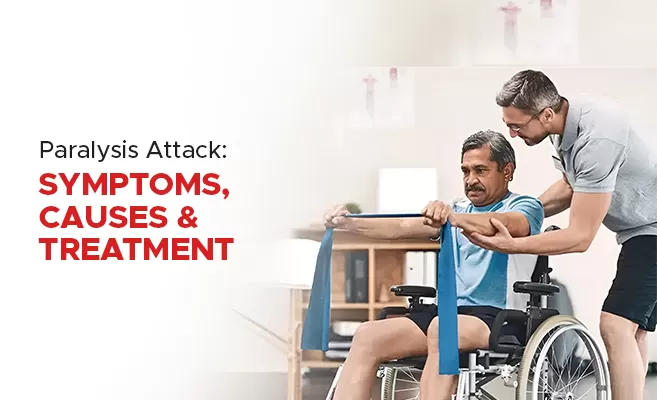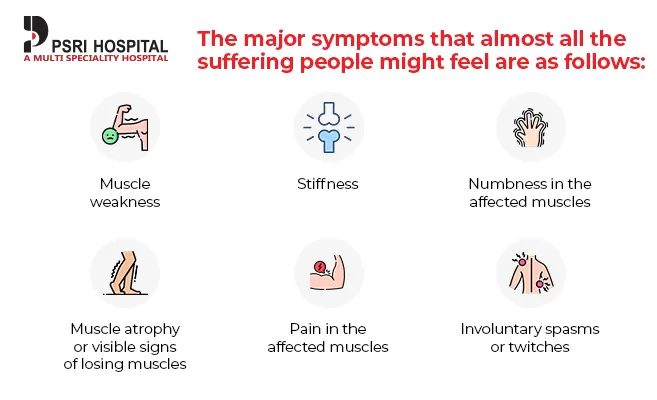Paralysis Attack: Symptoms Causes and Treatment

Experiencing a paralysis attack, whether it strikes suddenly or develops gradually, can be a deeply disturbing experience. Paralysis attack refers to the permanent or temporary loss of voluntary movement within the muscles in a particular body part or area.
It’s essential to get the intricate details surrounding its symptoms, causes, and treatment options to navigate this challenging condition effectively. In this blog, we explore paralysis attacks more, aiming to provide comprehensive insights that empower understanding and facilitate informed decisions about care and management.
What is a Paralysis Attack?
The loss of voluntary muscle function in a part or more of the body is known as paralysis. It is the result of damage caused to the nervous system. The nervous system consists of two different parts, which are as follows:
- CNS: Also known as the central nervous system. It involves the spinal cord and brain.
- PNS: The peripheral nervous system consists of the nerves present outside of the central nervous system.
The neurons or nerve cells present in the PNS are responsible for performing multiple functions. For example, motor neurons help in regulating the movement of muscles. The sensory neurons are responsible for sharing or transmitting information to the CNS. This information contains the pain, pressure, temperature, and so on. If any nerves, brain, or spinal cord get damaged, the nerve signals get interrupted. It is the primary cause of the paralysis attack.
Symptoms of Paralysis Attack
The people who get paralysis attacks would not be able to move the entire or partial part of the affected body. The location of the injury accompanies the loss of the sensation. Different people sense different symptoms accordingly. It can vary depending on several factors, such as the location of the injury, the type of the issue, the cause of the injury, and more.

Causes of The Paralysis Attack Symptoms
According to some studies, many causes of paralysis are commonly found among people. In the present time, the most common causes of paralysis attacks are as follows:
- Spinal cord injury
- Multiple sclerosis
- Stroke
- Cerebral palsy, and so on.
The damage to the nervous system is responsible for muscle weakness and paralysis. It can be caused due to any health issues that occur in the human body. The nervous system is responsible for performing multiple tasks within the body.
A good system sends the information between the brain and the rest of the body back and forth. Therefore, the nervous system needs to be healthy. The signal travels from the brain down to the spinal cord. It is then passed into the peripheral nervous system throughout the body.
The peripheral nervous system is responsible for the regulation of many functions. Some of them are as follows:
- Voluntary muscle movements (walking, moving, chewing, etc.)
- Automatic functions (for example- digestion, breathing, etc.)
- Sensory functions (for example- temperature, pain, pressure observation, and so on).
The overall health and quality of life of a person can be affected by damage to any part of the nervous system. Mentioned below are some of the major causes through which the nervous system gets damaged, resulting in muscle weakness or paralysis.
- Infections like polio, meningitis, encephalitis, etc.
- Motor neuron diseases, for example, ALS and primary lateral sclerosis
- Inherited disorders
- Spinal muscular atrophy, hypokalemic or hypokalemic partial paralysis
- Brain tumour
- Spinal cord tumour
- Spina bifida, which means the incomplete development of the spine, brain, or spinal cord
- Autoimmune diseases such as Guillain-Barre syndrome and lupus
Treatment of Paralysis Attack Symptoms
There is no proper cure available for the paralysis attack in today’s world. In some cases, people experience complete or partial recovery. It depends upon the type and cause of the attack. Bell’s palsy or stroke are some examples of temporary paralysis. The temporary ones have higher chances that they might get resolved either on their own, by a few medications, etc.
If a person is paralysed because of a chronic neurological condition or a spinal cord issue, they might recover with partial muscle control. However, rehabilitation can help in preventing the symptoms from getting worse. But it doesn’t cure the issue completely.
The possible paralysis attack treatments that help are:
- Medications
- Physical therapy
- Surgical amputation
- Mobility devices (walkers, braces, wheelchairs)
- Occupational therapy
- Nerve transfer surgery
The Bottom Line
Paralysis is caused in one or more body parts and results in permanent or temporary loss of function and movement. Many people with this condition cannot regain full sensation or mobility in the affected area. Some people with paralysis symptoms ignore it and suffer more.
However, their quality of life can be enhanced by performing different activities such as getting physical therapy, medications, and so on. Social and emotional support also helps people while recovering from the issue. If you have any paralysis symptoms, get a consultation with the best neurologist in South Delhi at PSRI Hospital. Our specialists help people to recover and let them know about the underlying causes. Explore the website to know more.
FAQs
What is a paralysis attack?
A paralysis attack refers to the loss of voluntary muscle movement in one or more parts of the body due to damage to the nervous system.
What are the common symptoms of paralysis?
Common symptoms include muscle weakness, stiffness, numbness, muscle atrophy, pain, and involuntary spasms or twitches in the affected area.
What causes paralysis attacks?
Paralysis can be caused by conditions like spinal cord injury, stroke, multiple sclerosis, cerebral palsy, and infections like polio or meningitis that affect the nervous system.
Is there a cure for paralysis attacks?
There is currently no complete cure for paralysis, but treatments such as medications, physical therapy, surgery, and mobility devices can help manage symptoms and improve quality of life.
How can rehabilitation help with paralysis?
Rehabilitation programs can assist in maintaining muscle strength, improving mobility, and enhancing overall function in individuals affected by paralysis, depending on the severity and cause of the condition.

 Book An Appointment
Book An Appointment Virtual Consultation
Virtual Consultation





